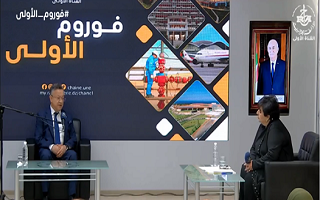ministerial activities
Mr. Kamel Baddari, the Minister of Higher Education and Scientific Research, confirms the sectorŌĆÖs role in executing the President of the RepublicŌĆÖs instructions

On 10 February 2025, during his appearance on the Forum of Channel 1 of the national radio, Mr. Kamel Baddari, the Minister of Higher Education and Scientific Research, stated that the reforms of the university services mandated by the President of the Republic, are currently monitoring the needs of the students to achieve the outcomes that will be submitted to the government. This endeavour involves the collaborative efforts with the Ministry of Youth, for which committees and workshops have been formed.
Since the university reforms are multidimensional, committees and think tanks are operating within the Inter-Ministerial Committee that bridges Higher Education and the Youth sectors. Their objective is to ensure the provision of adequate services in alignment with the annual budget allocated by the State. This budget must reflects the realities of the ground and attain a notable level students satisfaction. The reforms are crucial not only for enhancing educational and training outcomes, but also for fulfilling the political aim of preparing graduates who are well-equipped with the necessary training, so that each student is at the level of the responsibilities they will assume in the future.
In preparation for the upcoming academic year 2025/2026, the Minister stated that ŌĆ£the objective is to expand the use of English, especially given that 80% of specialties, notably science and technology, are delivered in English, by proficient professors, and therefore, strengthening this aspect is a crucial aim for the next academic year. The necessary subjects will also continue to be supported to elevate the quality of university education, namely, mathematics, computer science, artificial intelligence and software. Furthermore, the Minister of Higher Education added, these subjects will be integrated into the humanities curriculum to ensure uniformity in studentsŌĆÖ proficiency across all branches and to enable the humanities and social sciences to contribute to the development of the national economy.ŌĆØ
The Minister pointed out that the University is keeping pace with global technological changes and digitalisation. Consequently, the sector has developed a special program for the years 2024 to 2029, aligned with the President of the RepublicŌĆÖs program, which aims to focus on three strategic axes: improving the quality of higher education and scientific research, prioritising science and mathematics, and establishing the University a pillar of the innovative economy.
He added that the University is opened to the mining sector and to the landscaping of training and higher education in terms of mine engineering and geology across various universities, particularly in regions where mining activities are prevalent. This initiative aims to train specialists who meet the sectorŌĆÖs demands.
The Minister elaborated on the significance of scientific research in stimulating the economy, noting that there are 21 research centres, each associated with a commercial enterprise. This collaboration enables research concepts to be developed and marketed into complete products that benefit the citizens.
Scientific research is dedicated to addressing strategic problems associated with security at all levels, including water, energy and health, particularly as it transitions into the fourth generation stage (4.0), alongside universities of similar calibre. It is anticipated that the distinctive features of Algeria as an emerging country will begin to manifest by 2027, following the outcomes derived from comprehensive training programs, such as the innovative doctoral approach that has directed focus towards essential disciplines that give impetus to the national economy. This is especially pertinent given the transformative impact of entrepreneurship within the academic environment, which has reshaped the vision of the training through the numerous start-ups originating from university institutions within a span of two years. New procedures or agreements concluded with various economic institutions are underway to diversify and modernize this trend, and increase the number of the participants to reach 20,000 start-ups by 2029, in line with the President of the RepublicŌĆÖs program. Mr. Kamel Baddari asserted that in the last year alone, 111 start-ups and about 930 micro-enterprises were established within academic institutions, positioning them to further enhance these figures in the years ahead.
Details of the meeting via the link:
https://news.radioalgerie.dz/ar/node/59765
┬Ā
